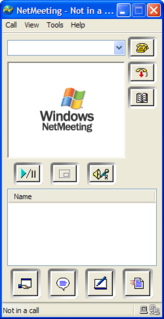About
OPAL implements a wide range of Voice over IP (VoIP) protocols for voice, video and fax data over IP networks.
It is written in C++ and released under the Mozilla Public Licence.
OPAL utilises the PTLib portable library that allows OPAL to run on a variety of platforms including Unix/Linux/BSD, MacOSX, Windows, Windows mobile and embedded systems.
Opal was developed as a derivative of the OpenH323 library.
The OpenH323 project had as its goal the development of a full featured, open source (MPL) implementation of the H.323 Voice over IP protocol. The code was written in C++ and, through the development effort of numerous people around the world, supported a broad subset of the H.323 protocol. The software has since been integrated into a number of open source and commercial software products.
The Session Initiation Protocol (SIP) is a signaling protocol used for initiating, maintaining, and terminating real-time sessions that include voice, video and messaging applications. SIP is used for signaling and controlling multimedia communication sessions in applications of Internet telephony for voice and video calls, in private IP telephone systems, in instant messaging over Internet Protocol (IP) networks as well as mobile phone calling over LTE (VoLTE).
Inter-Asterisk eXchange (IAX) is a communications protocol native to the Asterisk private branch exchange (PBX) software, and is supported by a few other softswitches, PBX systems, and softphones. It is used for transporting VoIP telephony sessions between servers and to terminal devices.

Asterisk is a software implementation of a private branch exchange (PBX). In conjunction with suitable telephony hardware interfaces and network applications, Asterisk is used to establish and control telephone calls between telecommunication endpoints, such as customary telephone sets, destinations on the public switched telephone network (PSTN), and devices or services on voice over Internet Protocol (VoIP) networks. Its name comes from the asterisk (*) symbol for a signal used in dual-tone multi-frequency (DTMF) dialing.
The H323Plus project, formerly OpenH323, has as goal developing a full featured, open source (MPL) implementation of the H.323 Voice over IP protocol. The code is written in C++ and, through the development effort of numerous people around the world, fully supports the H.323 protocol. The software has been integrated into a number of open source and commercial software products.

Microsoft NetMeeting is a discontinued VoIP and multi-point videoconferencing client included in many versions of Microsoft Windows. It uses the H.323 protocol for videoconferencing, and is interoperable with OpenH323-based clients such as Ekiga, OpenH323, and Internet Locator Service (ILS) as reflector. It also uses a slightly modified version of the T.120 Protocol for whiteboarding, application sharing, and file transfers.
The next-generation network (NGN) is a body of key architectural changes in telecommunication core and access networks. The general idea behind the NGN is that one network transports all information and services by encapsulating these into IP packets, similar to those used on the Internet. NGNs are commonly built around the Internet Protocol, and therefore the term all IP is also sometimes used to describe the transformation of formerly telephone-centric networks toward NGN.

A VoIP phone or IP phone uses voice over IP technologies for placing and transmitting telephone calls over an IP network, such as the Internet, instead of the traditional public switched telephone network (PSTN).
This is a comparison of voice over IP (VoIP) software used to conduct telephone-like voice conversations across Internet Protocol (IP) based networks. For residential markets, voice over IP phone service is often cheaper than traditional public switched telephone network (PSTN) service and can remove geographic restrictions to telephone numbers, e.g., have a PSTN phone number in a New York area code ring in Tokyo.
Mobile VoIP or simply mVoIP is an extension of mobility to a Voice over IP network. Two types of communication are generally supported: cordless/DECT/PCS protocols for short range or campus communications where all base stations are linked into the same LAN, and wider area communications using 3G/4G protocols.
FreeSWITCH is a free and open-source application server for real-time communication, WebRTC, telecommunications, video and Voice over Internet Protocol (VoIP). Multiplatform, it runs on Linux, Windows, macOS and FreeBSD. It is used to build PBX systems, IVR services, videoconferencing with chat and screen sharing, wholesale least-cost routing, Session Border Controller (SBC) and embedded communication appliances. It has full support for encryption, ZRTP, DTLS, SIPS. It can act as a gateway between PSTN, SIP, WebRTC, and many other communication protocols. Its core library, libfreeswitch, can be embedded into other projects. It is licensed under the Mozilla Public License (MPL), a free software license.
H.323 is a recommendation from the ITU Telecommunication Standardization Sector (ITU-T) that defines the protocols to provide audio-visual communication sessions on any packet network. The H.323 standard addresses call signaling and control, multimedia transport and control, and bandwidth control for point-to-point and multi-point conferences.
T.38 is an ITU recommendation for allowing transmission of fax over IP networks (FoIP) in real time.

Empathy is an instant messaging (IM) and voice over IP (VoIP) client which supports text, voice, video, file transfers, and inter-application communication over various IM protocols.

The Common ISDN Application Programming Interface is an ISDN-conformant standardized software interface. With the help of the CAPI-Interface computer software intended for the use with ISDN can be provided, without knowledge of the deployed, proprietary ISDN card.

GNU Gatekeeper is an open-source project that implements an H.323 Gatekeeper based on the OpenH323 or H323Plus stack. A gatekeeper provides address translation, admissions control, call routing, authorization and accounting services to an H.323 system defined on the H.323 standard by ITU-T.
A softphone is a software program for making telephone calls over the Internet using a general purpose computer rather than dedicated hardware. The softphone can be installed on a piece of equipment such as a desktop, mobile device, or other computer and allows the user to place and receive calls without requiring an actual telephone set. Often, a softphone is designed to behave like a traditional telephone, sometimes appearing as an image of a handset, with a display panel and buttons with which the user can interact. A softphone is usually used with a headset connected to the sound card of the PC or with a USB phone.






